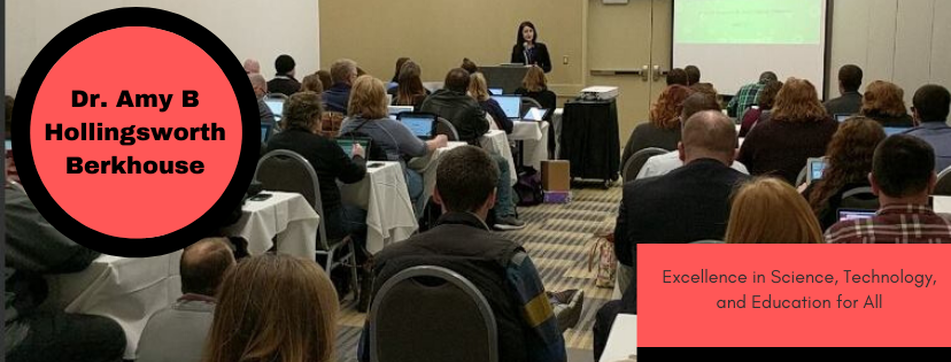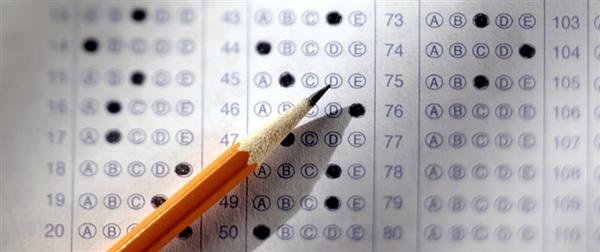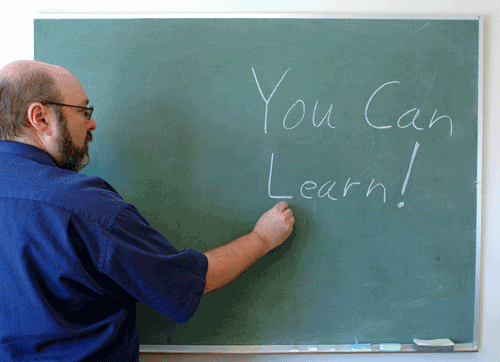If I want to get into law school, I have to take the LSAT. The LSAT is a standardized test that measures reading skills, analytical skills, and logical reasoning. This test is described as “providing a standard measure of the acquired reasoning and reading skills of law school applicants.” When a student has taken and passed the LSAT, the law school has a reasonable understanding of what this applicant is able to do - read, and reason. I am glad that every lawyer has had to take that test, in order to understand and comprehend the law, and all it's intricacies.
What, then, do we want from the professionals that are part of our daily lives - our teachers? When I wanted to become a teacher, in Texas, I took the TExES, or the Texas Examination of Educator Standards. As I remember, there were two parts - one part about the subject matter, and one part about understanding teaching. I actually remember the day I took that test. I was living on the Mexican border, and I had to drive to San Antonio for the proctored, secure examination. There were two other teachers with me in the car for the 2 ½ hour drive - one was a teacher’s aide who had completed her coursework, and wanted to move up into a teaching role. The other was an “emergency certified” teacher, like me, except that this was his third time taking the test, and his last try before he would be let go from his teaching position. When you were on an emergency certification (I was, because I had a Biology degree, but no teaching experience. I took all the classes while teaching full time) and you had three years from when you started to pass all the classes, and take the test. If you couldn’t pass the tests, you lost your job.
I had always accepted that this was how the system worked. I was never angry that I had to pass a test. I was never mad at the test, or fearful of the tests. I knew that if I did all the practice tests, reviewed the materials, approached my professors at school about anything I was unclear of, and just took care of business, I’d pass the test. Sure, it wasn’t fun to study. It was tedious. It was boring. It got in the way of some fun stuff I wanted to do on the weekends. But, if I wanted to be a teacher, and I did, I would pass that test. I invited friends over to study. I made binders full of material about each topic, flashcards, even read my study material out loud so I could record it and play it in my car on the way into work. I knew I had it.
(Beware, this paragraph has swearing in it) At the time, I was living with a person who wanted to become a federal agent. He also had to pass a test. He went through 3 months of intense academy to learn to shoot, learn the law, learn the job, and learn Spanish. Then, he had one year from when he started working as a recruit, until he took the test, and would either pass, or get fired from his job. Our attitudes about “the test” were a million miles apart. My attitude was “If I want this job, I take this test. Obviously it’s a test I can pass, because most of my fellow teachers have passed it, so I just need to buckle down and do this.” His attitude was “I hate this f**king test! It’s so unfair that some of these guys are Hispanic, and we are both being tested the same way on if we know Spanish. It’s not fair. If you’re a native speaker, you have an advantage. And what if I’m having a bad day, and can’t shoot? What if I’m sick? What if I can’t remember a stupid little law, or mix it up? I mean, I know the laws in general, but what if they pull out an obscure law and I miss it? This whole test is bulls**t! And my job depends on it! What if I fail, and I have to go get another job? People will know I failed. F**k this, no F**K THIS!!!!”
The closer we got to his year, the more angry, aggressive, and paranoid he got. He didn’t settle in to study - he spent a lot of time bitching with the other recruits. His first topic of conversation at every meeting with another recruit would be “The test… blah.. blah… angry blah.” I noticed that several people, especially the native Spanish speakers, stopped hanging around us. He was mad all the time. He would take his weapon with him everywhere - to the grocery store, to Walmart, to friends’ houses. He treated me in an increasingly hostile manner, because I would ask him if he wanted to study together for our tests, go out to meet new friends I had at the school and their husbands, or go to the gym and exercise (he said all the walking from the job made him miserable and tired). He became known as “Amy’s angry boyfriend.” I made excuses, “He’s just upset about this test. It will pass. He’ll pass the test, and then everything will be fine.” Finally, I broke up with him three months before his test, because I couldn’t live like that. Being surrounded by hostility about the test, anger over studying, constant anxiety about failing, fearfulness about losing a job, and test-aggression was making me physically sick. It was like a disease to all those around us. It weighed on our lives, and broke us apart.
Friends, there are teachers who's attitudes are like mine, and teachers who have an attitude like my boyfriend in your child’s school, who's emotions feed into your child, who are preparing them to take their tests, and ultimately, to graduate. I actually used to be the one designated science teacher who would be assigned every student who hadn’t been able to pass their graduation exam. I worked with these students a period a day, after school, and on Saturdays. I had material for them on EVERY CONCEPT that would be on their tests. I meticulously scoured through old, released graduation tests, figured out which standard the question applied to, and then made mini-tests for my students to take on each assigned topic. I bought them all green highlighters (somewhere I read that if you liked green, you were smart, I don’t know if there is a smart color, but it sounded good) and peppermints (I read that peppermints helped you concentrate), and so any time you came to me for test prep, you got a green highlighter and a peppermint. Somewhere I read that yoga helped people de-stress and focus, so on test days, I would lead my class in yoga pre-test.
One semester I started off with 128 seniors who had failed their senior science graduation exam. I read, re-read, practiced, encouraged, cheer-leaded, and gave them tips and tricks to beating multiple choice tests. I became known as the test whisperer - I could help you pass the test. I knew everything there was to know about that damn test, and I knew how to help students pass it. That year, I got every student to pass except SIX. And I remember those six, very vividly. One girl had such negative talk, that she refused to even read the test. She marked her scantron, and then fell asleep, every time she took the test. She repeated to me often, “I’m a failure. It’s OK, I know I’m not going to graduate. I don’t care anymore.” She set herself up for failure, and no matter what I did, she refused to even try. Another girl refused to speak English. We were on the Mexican border. Even though I never taught in Spanish, I understood it, and she understood me in English, but she would never answer any question in English, no matter what I did. All her other teachers just allowed her to speak Spanish (80% of the teachers on the border are Spanish speaking also), so she refused to do anything but speak Spanish. Another boy was a gang leader, and was only at school to attempt to sell drugs. He was suspended so much that I barely got to see him. When I did have him in class, he was sulking, in a foul mood, and staring into space. He was preoccupied, and wanted nothing to do with me or the class.
Even the best of teachers can’t reach everyone. I consider myself one of the best, most professional teachers there is. I was part of an amazing group of teachers in my department who worked together the make the science experience amazing for our students. And by everything you hear on the news today about students, we should have had utter failure in our school. We had 99% Spanish speaking students. Most of our kids were on free lunch. We had gangs, drugs, students with children, and troubled students. But we all said, “there is no reason we can’t get everyone to pass the graduation tests.” And we were right. We pulled our resources, at our department meeting each week we would each bring our best lessons on a given topic, and then make a plan so that each teacher in the department did that best lesson, and then we revised it together to make it better, make rubric answer keys, make common powerpoints, find labs that worked with that lesson, and made sure it aligned to the standards. We got to be so good at it, that in three years, we went from 39% passing the graduation tests, to 89% when I left the school. We were professionals at getting kids to pass the tests.
And never would I say we “taught to the tests.” We taught everything that was ON the test, sure, but we also got to highlight the topics we loved (one teacher loved plants, and another loved evolution). The labs we did with the students were fun and hands on, and we loved that our lesson planning was a collaborative effort. We never felt alone, because we were professionals who met regularly and took each person’s strengths, and highlighted them. Some days, all the Biology teachers would meet in the lecture auditorium, and bring all their classes of students, and one of the teachers who was really good at the topic would put on an exciting production with multimedia presentations, an outline for the students to take notes, and the other teachers would be out in the “audience,” helping kids who had questions, kids who were sleeping (you all know it happens), or helping students who needed assistance. Mostly, though, these production days were looked forward to by the kids, because it was like watching a concert, with a rockstar teacher leading.
What it took to make this happen was a collaboration between our school, and the UT Charles A Dana Center at The University of Texas in Austin. We did what was called “The Professional Teaching Model.” I plan to write more about it in the future, because it was that program that helped us turn ourselves from troubled, tired teachers, to professional teachers. We were amazing. And it was HARD! But as we all know, teaching is HARD, whether you’re succeeding or failing - so why not make it successful?
And for parents, who would you rather have leading your class? Someone like me, a professional teacher, who is motivating and fun, and hitting every standard and getting your child to pass those tests? Or someone who is constantly bitching about how unfair the tests are, how they hate the standards, and how burnt out and angry they are? A teacher who feels hopeless and angry, or who works with their department and school to be part of a collaborative, professional, efficient, effective team? Who IS your kid's teacher? If you ARE a teacher, who are YOU?
There is a popular author who has a blog that I often see shared who I absolutely despise. I won’t even mention her name, but she’s an educational historian who is what I’d label as a “critical theorist.” She is critical of education, and spends all her time breaking down how bad education is, how bad teachers are treated, how bad politics affect education, how bad the common core is, how bad testing is, and basically how bad EVERYTHING is. She offers no solutions that are feasible. She makes teachers despair even more. She amplifies criticisms, finds faults in the system that she says make it hostile, and writes books to terrorize teachers, and make them afraid. She’s a s**t-stirrer, s**t-flinger, and an irresponsible, critical, worthless hack (in my opinion). And I feel sad for every teacher who climbs on board with her, ready to complain and waste their time fighting against standards. And I plan to write, teach, motivate, and educate until she goes away. I will talk louder, write more, motivate, encourage, and enable success in the profession that I LOVE. Because I believe every school district, every single school, every department, and every teacher is part of this amazing profession called EDUCATION, and that people would prefer to be lifted up, instead of held hopeless to the ground. We all got into this profession to make our lives, the lives of our students, and the education in this country get better. And I, friends, am just getting the ball rolling.
Who’s with me?




 RSS Feed
RSS Feed
